|
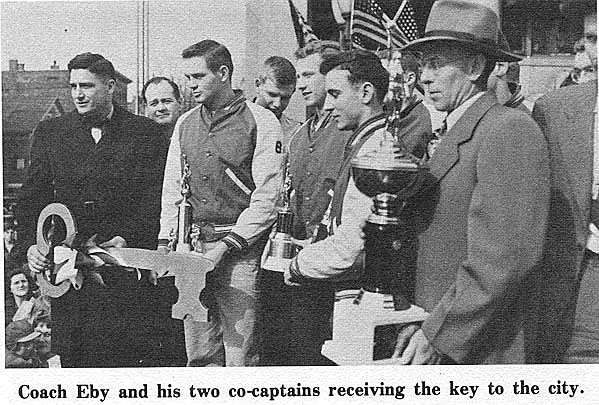
|
Coach Eby with co-captains Cox & Sowles after winning the Michigan state championship.
|
|
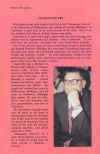
|
A write-up about Coach Eby - click on image to read
|
|
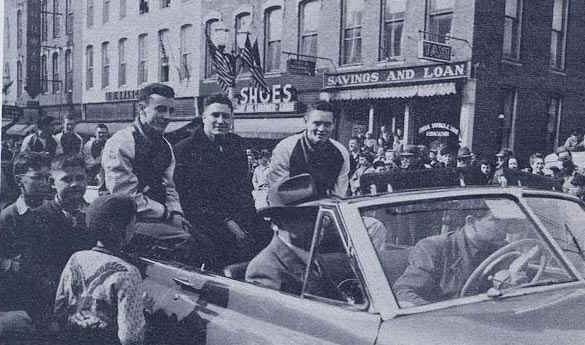
|
Coach Eby and Co-Captains Sowles and Cox receiving ride in convertible in parade, followed by other members of State Champion squad.
|
|
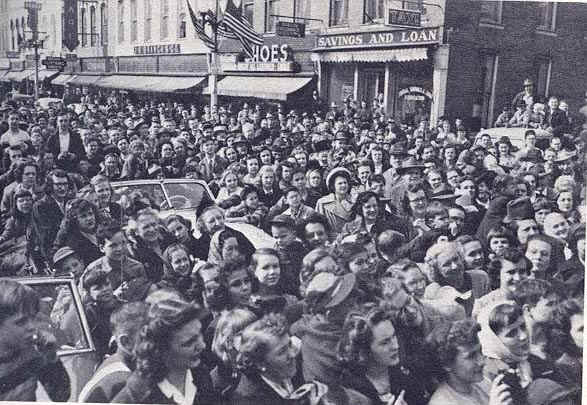
|
Victory parade following return home from state finals.
|
Coldwater's "49
championship changed the game
|
|
|
|
Detroit Free Press article
written by Tom Lang (son of 49er Ardith Betts Lang) |
| The high
school boys basketball tournament affects many different people in many
different ways in Michigan.
But fans share at least
one thing: They never forget their championships.
And in Coldwater, they
certainly haven't forgotten their 1949 Class B title, when the Cardinals
beat River Rouge, 49-42.
The game was considered a
classic, not only for the play on the court, but for the basketball
masterminds pacing the sideline. Coldwater was coached by Floyd Eby.
River Rouge was led that night at East Lansing’s Jenison Fieldhouse by
Lofton Greene.
What Greene learned in
that defeat changed the style of River Rouge basketball and earned the
school 12 state titles in the following 35 years.
Eby is not as well-known
as Greene, and he would rather keep it that way,
"I have gotten far
too much attention over the years," Eby said from his house on
Cardinal Drive in Coldwater. "I am just very lucky to have been
able to coach at a school in such a great community with so many
wonderful young gentlemen. God has truly blessed me."
But what Eby taught
changed basketball forever. He is credited by numerous sources with
introducing and popularizing the fastbreak, the full-court press, the
box-and-one defense and the one-handed jump shot. In the1940s, that
style was unheard of, but was quickly labeled "racehorse
basketball."
The '49 state title was
Eby's second. His first came in 1940 in Class C at Williamston High. Eby
was a rookie coach at age 21 then and still in his senior year at
Michigan State, where he played center on the football team.
Eby first taught the new
style of basketball at Williamston.
Former Free Press Sports
Writer Hal Schram wrote this about Eby in 1959: "His offensive
theory is one of basic simplicity. Get to the basket with the shot that
will score as soon as you can. You're only going to sink a certain
percentage of your shots anyway, so the more you shoot, the more points
you'll score. Organized confusion - that’s what they called it
then."
Eby also was slightly
superstitious. During the tournament, he would wear the same clothes,
right down to the socks. He would also get his hair cut before every
game (including the regular season) by the town barber and fabled
storyteller - Lyle Betts.
As the Cardinals kept
winning in the '49 tournament, Eby kept visiting the little shop on
Chicago Street. But when Coldwater reached the finals, Betts was still
putting in a full day back home.
As Eby and his players
were about to take the floor for the state final. a commotion down the
hallway
caught their attention.
It was Betts, black bag in tow and two security guards chasing close
behind. Betts had sneaked in as the team doctor to make sure Eby got the
lucky haircut. The rest is history.
Coldwater, a town of
9,500 a few miles from the Indiana border, tries to keep that history
alive. The Cardinal Basketball Fanatics bring former players back as
honorary coaches for some regular-season games.
"We were trying to
introduce the community and the kids to their tradition and
history," Fanatics leader Patrick Rocchio said. "Notre Dame
has built a national tradition and we wanted to do the same thing here,
on a much smaller scale, of course. We wanted to see who some of these
heroes were and what these legends look like."
The legends of '49 have
done quite well since then. They include two dentists, an ordained
minister, a teacher and coach, two high-ranking Army officers, an
airline pilot, a pharmacist, a university science instructor and five
businessmen.
Eby, who has written a
book about his team still attends a few games and here's most others on
the radio.
And whatever happened to
the barber? He died of cancer one year ago.
We miss your laugh -
Grandpa.
|
Legends of the Game
|
1949
|
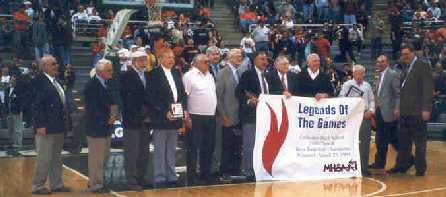
|
1999
|
| Receiving
the award at the Breslin Center at Michigan State University
are: left to right: Eugene Sowles, Bob Simmons, Marvin
Rosenberg, Jim Rhodes, Lawrence Porter, Bernard Hogenboom, Gene
Fry, Coach Floyd Eby, Rex Corless and Carlos Clark. |
| Excerpts
from Tom Lang's article on the ceremony: "In
1949, Coach Floyd Eby and his Coldwater Cagers changed the face
of the game by running to the MHSAA Championship. The game
was a major turning point that proved what Eby was coaching and
his players were executing would no longer be considered a
fluke." |
| "Eby
is credited by numerous sources with introducing and
popularizing the fast break, the full-court press, the
box-and-one zone defense and the one-handed jump shot (also
developed at Stanford University). In the 1940's , that
style of play was unheard of, but was quickly labeled 'racehorse
basketball.' The jump shot was developed as players didn't have
time to stop and gather their stance for the traditional
two-handed set shot. To do so would have defeated the
entire purpose of racehorse basketball." |
| "While
the Cardinal basketball team helped launch a whole new dimension
to basketball, it was the lifelong lessons of athletic
discipline that helped that 1949 Cardinals lead successful
lives. The team produced two dentists, an ordained
minister, a teacher and coach, two high-ranking Army Officers, a
pharmacist, a university science professor, two high-ranking
business executives and three successful businessmen." |
| "They
also produced great memories that a small, south central
Michigan town has cherished for 50 years, while helping to
create basketball as it's known around the world today." |
|
Ex-Coldwater Coach recalls 1949
team's run, run, run for title
|
|
1994 Battle Creek Enquirer article
by Todd Schulz |
| It has been 45
years. But Floyd Eby still remembers the March day when his Coldwater High
boys returned home with a Class B state championship trophy.
The Cardinals beat River
Rouge, 49-42, on a Saturday at Michigan State University's Jenison
Fieldhouse for the 1949 crown.
"We got up on Sunday,
went to church and started home," Eby said. "There were 30 or 40
cars waiting for us outside of town and they escorted us in. The next day
they called school off and had a parade."
Ah, the simple days.
"But then all they
wanted to talk about was winning it again, " Eby said with a laugh.
Obviously, things haven't
changed much.
To the chagrin of the
Coldwater faithful, Eby's 1950 squad didn't pull off the repeat. But they're
the last school in the Enquirer's coverage area to enjoy the chance.
It's been nearly a
half-century since one of 23 local schools won a state title.
So what was so special about
those 1949 Cardinals?
Talent? Sure, there was Rex Corless, a high-scoring, All-State forward. But Coldwater's success hinged
on its scheme.
"We played race-horse
basket-ball," said Eby, 76, who retired from coaching Coldwater in
1964. "When we got the ball, we went. And we pressed the whole game. We
didn't want it any other way."
"Well, I didn't want it any
other way and (the players) minded what I told them."
Coldwater ran, ran, ran. The
Cardinals didn't have time to slowdown for the traditional two-handed set
shot.
"I told them to start
throwing it with one hand," said Eby, who still lives in Coldwater.
"It was the one-handed jumpshot. We didn't hit the backboard for the
first few games. But then we started sinking them." In those days, one
official called each game. But one wasn't enough for Coldwater's pace, Eby
said.
"The officials didn't
like it," he said. "One referee couldn't keep up. He couldn't see
all the fouls. We got some breaks and we got some cheap (baskets) off the
fast break. "It was organized confusion. Only, most (opposing coaches)
didn't bother using the word, 'organized." But it won and I'm not
apologizing."
The 1949 Cardinals were 21-2,
including a great tournament run. They knocked off defending Class B
champion, St. Joseph, in the regional final, edged top-ranked Alma by one
point in the quarterfinals and defeated Godwin Heights in the semifinals.
Forward Jim Rhodes, guards Eugene Sowles and Gene Fry and center LeRoy Cox
joined Corless in the starting five that year. Max McConnell, Tom Engle,
Harry Cooper, Marvin Rosenberg, Bernard Hoogenboom, Fred Weeks, Larry Porter
- a player who Eby said walked "seven miles," each way to practice
- and Bob Simmons were the reserves.
"I carried 13 - my lucky
number," Eby said with a chuckle. "I had a lot of fun. I was tough
on them. "But I loved 'em. And they loved me."
|
| |
About Harry's
|
| We are
talking about Harry’s (now Irma’s) being monumental in our
memories, as related, in part, by a column written in 1994 in the
Daily Reporter by CHS Alum Joseph
Otis called Remember When...
..."What he and I
didn’t realize was that the place of business was actually known for
many years as The Velvet. I do not know which came first, the
fantastic ice cream that they produced in the spotlessly-clean shop
located north of the alley behind the store, known to everyone as
Velvet Ice Cream, or if the ice cream was named after the place of
business which manufactured this delicious product.
Now there is a problem
that I am sure someone can solve. If you know the answer, you win the
prize for the week and I will buy you an ice cream cone at the
location of your choice, even though it won’t be velvet. If Jim
Warkoczeski wins, he only gets a single dip, because he may have some
inside information.
You know this
establishment played a very important part in the lifestyle of so many
people, it is almost mind-boggling. Now Peggy and Pauline, don’t get
your dander up, I assure you that the Blue Bird, and Nicks will get
equal mention in future articles.
I can remember even as
a small child being taken to the Velvet after a movie by my mother and
the Awe that greeted me as I walked through the door. The sweet
goodness of the Aroma of Candy, ice cream, those sweet and succulent
syrups, those marvelous machines they had that could juice an orange
or lemon, or whip ingredients for a malted milk shake, that fantastic
soda fountain which could spew out carbonated water in an instant, the
chrome, stainless steel, the marble, the brightly polished mirrors,
your mind could conjure up the feeling of ecstasy of a banana split
even if you could only afford a nickel coke.
As we grew older and
more mature, our outlook changed because you could meet a girl at
Harry’s, or hang out with your friends and talk about meeting girls,
always hoping that perfect person would walk through the door and you
could share a coke and get better acquainted.
Harry’s was quite
well known as an information source, in those days we didn’t have a
local radio station and if you wanted to know how the game was going,
you called Harry’s and Tony, Gene, or Bill would give you the score,
or final results, they could even tell you what the other Twin Valley
Scores were because of the constant flow of fans coming into the store
and relating this information.
I am sure that many
married couples today may have met for the first time at Harry’s, or
by a message left to call or contact a particular person have created
lasting bonds. Stop and think what influence Harry’s Velvet Ice
Cream Parlor had on your life."
Thanks, Joe, for
bringing back the memories. Perhaps this is why we were privileged
during the past two reunions - with many thanks to Irma - to have our
final breakfast prepared there by our two fine 49er Chefs - Chez Woods
& Fredericks.
|
| |
|